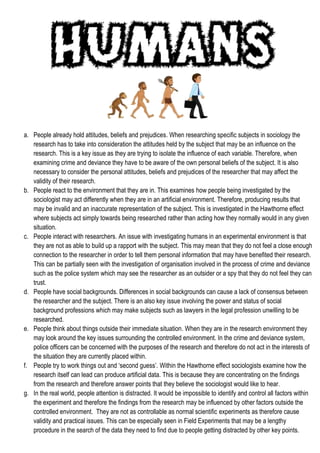
Considering the Influences of Attitudes, Environments, and Backgrounds in Sociological Research
- 1. a. People already hold attitudes, beliefs and prejudices. When researching specific subjects in sociology the research has to take into consideration the attitudes held by the subject that may be an influence on the research. This is a key issue as they are trying to isolate the influence of each variable. Therefore, when examining crime and deviance they have to be aware of the own personal beliefs of the subject. It is also necessary to consider the personal attitudes, beliefs and prejudices of the researcher that may affect the validity of their research. b. People react to the environment that they are in. This examines how people being investigated by the sociologist may act differently when they are in an artificial environment. Therefore, producing results that may be invalid and an inaccurate representation of the subject. This is investigated in the Hawthorne effect where subjects act simply towards being researched rather than acting how they normally would in any given situation. c. People interact with researchers. An issue with investigating humans in an experimental environment is that they are not as able to build up a rapport with the subject. This may mean that they do not feel a close enough connection to the researcher in order to tell them personal information that may have benefited their research. This can be partially seen with the investigation of organisation involved in the process of crime and deviance such as the police system which may see the researcher as an outsider or a spy that they do not feel they can trust. d. People have social backgrounds. Differences in social backgrounds can cause a lack of consensus between the researcher and the subject. There is an also key issue involving the power and status of social background professions which may make subjects such as lawyers in the legal profession unwilling to be researched. e. People think about things outside their immediate situation. When they are in the research environment they may look around the key issues surrounding the controlled environment. In the crime and deviance system, police officers can be concerned with the purposes of the research and therefore do not act in the interests of the situation they are currently placed within. f. People try to work things out and ‘second guess’. Within the Hawthorne effect sociologists examine how the research itself can lead can produce artificial data. This is because they are concentrating on the findings from the research and therefore answer points that they believe the sociologist would like to hear. g. In the real world, people attention is distracted. It would be impossible to identify and control all factors within the experiment and therefore the findings from the research may be influenced by other factors outside the controlled environment. They are not as controllable as normal scientific experiments as therefore cause validity and practical issues. This can be especially seen in Field Experiments that may be a lengthy procedure in the search of the data they need to find due to people getting distracted by other key points.